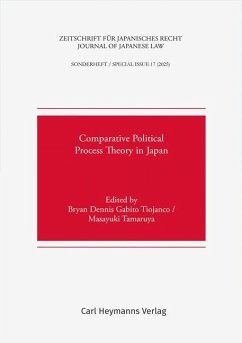Comparative Political Process Theory (CPPT) adopts John Ely s thesis that courts should protect the political process but goes beyond it in breadth, worry, scope, proposed remedies, and aim. This issue collects the papers of the Japanese scholars who presented at an April 2023 international symposium on CPPT at the University of Tokyo.
Bryan Tiojanco and Masayuki Tamaruya contextualize the CPPT in Japan symposium. Shigenori Matsui defends Ely s theory against its critics and explains its enduring significance. Yasuo Hasebe urges CPPT to endorse Rawlsian political liberalism as a model of democracy. Keigo Obayashi argues that Ely s theory ill-fitted Japanese constitutionalism, but that CPPT might prove a better fit. Nobuki Okano argues that CPPT reframes the catalytic review of Japanese courts as representation-reinforcement. Minori Okochi discusses ongoing same-sex litigation in Japan and suggests CPPT s prospects. Hajime Yamamoto argues that the plight of noncitizensin Japan poses a challenge for Japanese constitutionalism and CPPT. Rosalind Dixon reviews all the essays and connects them to CPPT scholarship.
Bryan Tiojanco and Masayuki Tamaruya contextualize the CPPT in Japan symposium. Shigenori Matsui defends Ely s theory against its critics and explains its enduring significance. Yasuo Hasebe urges CPPT to endorse Rawlsian political liberalism as a model of democracy. Keigo Obayashi argues that Ely s theory ill-fitted Japanese constitutionalism, but that CPPT might prove a better fit. Nobuki Okano argues that CPPT reframes the catalytic review of Japanese courts as representation-reinforcement. Minori Okochi discusses ongoing same-sex litigation in Japan and suggests CPPT s prospects. Hajime Yamamoto argues that the plight of noncitizensin Japan poses a challenge for Japanese constitutionalism and CPPT. Rosalind Dixon reviews all the essays and connects them to CPPT scholarship.








